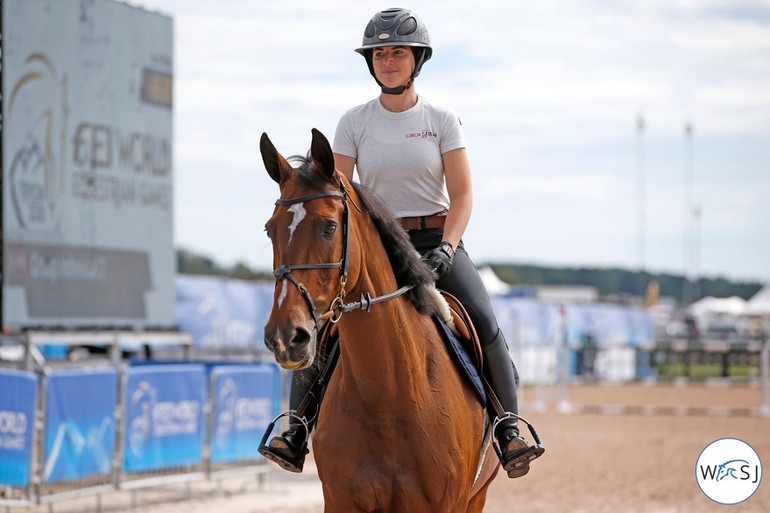Text © World of Showjumping
Emma Augier De Moussac’s provisional suspension has come to an end, after the Czech showjumper and the FEI entered an agreement ratified by the FEI Tribunal. Augier De Moussac requested a voluntary provisional suspension in December last year, after she had returned a positive test on hydrochlorothiazide during the CSI3*-W Designated Olympic Qualifier for Group C in Budapest, Hungary in June 2019. Under the 2019 WADA Prohibited List, hydrochlorothiazide is prohibited in- and out- of competition.
Augier De Moussac managed to establish that the hydrochlorothiazide had entered her system through a weight-loss supplement called New Green Gold, which she explained that she had used for beauty-oriented objectives only. The product was marketed and sold as 100% natural, and neither hydrochlorothiazide nor any other prohibited substances were listed as ingredients. Following the positive test, Augier De Moussac carried out an analysis of the product in a specialised laboratory which confirmed the presence of hydrochlorothiazide – alongside several other prohibited substances under the WADA Prohibited List. The lab analysis confirmed that the product contained mostly produced pharmaceuticals and was not natural at all. Augier De Moussac admitted the violation, and cooperated with the FEI.
In the reasoning of the case, the FEI stated that Augier De Moussac in accordance with ADRHA art. 10.2.3 had demonstrated that the ingestion and consumption of the prohibited substance was not intentional.
As to the level of fault and negligence for the rule violation, the FEI stated:
“The FEI’s is of the opinion and it is also commonly accepted by CAS, that the use of a supplement is regarded as taking a risk and extreme caution is recommended regarding such use, since there is a significant risk that the conduct of using a supplement might result in an anti- doping rule violation. Despite warnings from WADA, NADOs, IFs and NFs, an athlete taking supplements is manifestly disregarding that risk. In other words, an athlete is not considered to have exercised utmost caution when the Adverse Analytical Finding (AAF) is the result of the use of a supplement.
In addition, the rules (Art. 10.4 of the ADRHA) are clear that no fault or negligence cannot apply in cases when an Adverse Analytical Finding is resulting from a mislabeled or contaminated vitamin or nutritional supplement, since athletes are responsible for what they ingest and have been warned against the possibility of supplement contamination. Consequently, an elimination of the period of ineligibility under the provisions for no fault or negligence, Article 10.4 of the ADRHA, can therefore not be applied in the case at hand.
The FEI is however of the opinion that the Athlete has established that she bears no significant fault or negligence, (Art. 10.5 ADRHA) for the rule violation. This article specifically states that sanctions for Specified Substances or Contaminated Products shall be, at a minimum, a reprimand and no period of ineligibility, and at a maximum, two years of Ineligibility, depending on the Athlete’s degree of fault.”
Concluding in line with similar case law, the FEI decided that an appropriate and proportionate sanction would be a twelve-months ineligibility period. It was found that the rules allowed for starting the ineligibility period as early as the date of sample collection – 28 June 2019. All results obtained by Augier De Moussac in the period between the sample collection and the voluntary provisional suspension imposed on 23 December 2019 were therefore disqualified, with the suspension ending on 27 June 2020.
Click here to read the full decision









